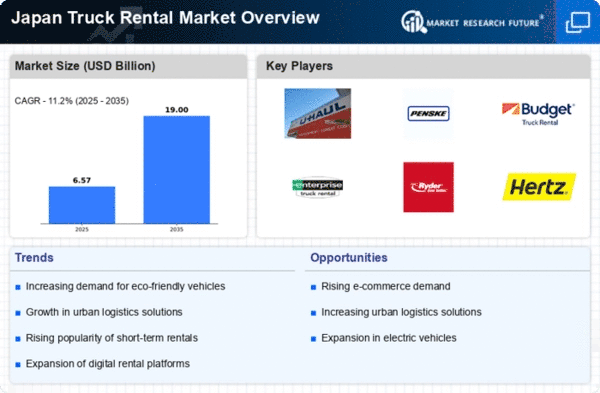The Japan Truck Rental Market is characterized by a robust competitive landscape where numerous companies are vying for dominance in a sector driven by urban logistics and transportation demands. The market has shown resilience in the face of economic fluctuations, fostering innovation and expansion among service providers. With increasing e-commerce activity and a growing need for efficient goods transportation, the market has expanded significantly, leading to diverse offerings that include short-term rentals, long-term leasing, and specialized truck services tailored to various industries.
Key players are focusing on enhancing their service networks, investing in technology, and offering flexible rental options to meet evolving consumer needs. The competitive insights highlight a balance between established enterprises and emerging companies, all striving to enhance operational efficiencies and customer satisfaction in response to changing market dynamics. Daiwa RentACar has established a solid foothold in the Japan Truck Rental Market, distinguishing itself through its strong customer service and comprehensive fleet that caters to both personal and business requirements.
The company excels in providing a wide range of rental options that include light trucks, cargo vans, and specialty vehicles, catering especially to the logistics and moving sectors. One of the company’s key strengths lies in its extensive network and infrastructure, enabling access to a broader customer base across urban and rural areas. Daiwa RentACar has been proactive in embracing technological advancements, which have streamlined operational processes and enhanced the overall customer experience. Their strategic focus on sustainability and fleet modernization has positioned them favorably against competitors within the Japanese market, showcasing their commitment to innovation and quality service.
Toyota Rent a Car holds a prominent position in the Japan Truck Rental Market, leveraging its parent company’s esteemed reputation for quality and reliability. The company offers a diverse range of vehicles, including trucks suited for various commercial applications, thereby appealing to a wide spectrum of clients, from small businesses to large enterprises. Toyota Rent a Car’s strengths lie in its extensive brand recognition, a well-maintained fleet, and an efficient service network that spans the country.
Additionally, the company has invested in improving customer service through enhanced online booking and support systems. Strategic partnerships and collaborations have bolstered its market presence, aiming to adapt to customer preferences and trends. The company's commitment to quality control and vehicle maintenance ensures high customer satisfaction levels, further solidifying Toyota Rent a Car's position in a competitive market landscape. Through its focus on customer-centric services and innovative solutions, Toyota Rent a Car continues to thrive in meeting the evolving demands of the trucking sector within Japan.

















Leave a Comment